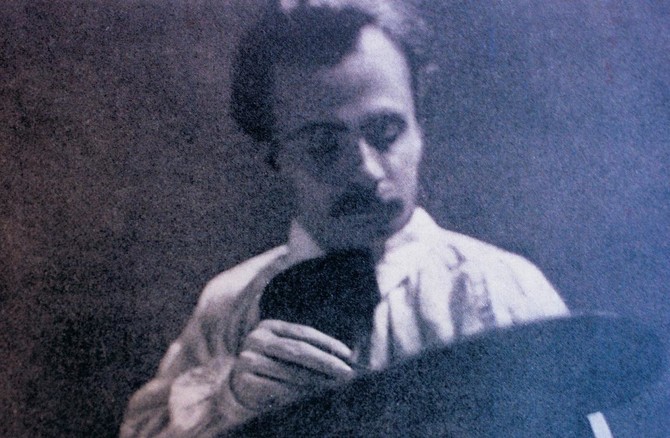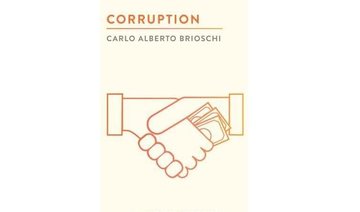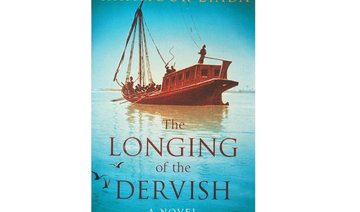“Gibran Khalil Gibran: Alive” is unlike any book ever written about the Lebanese-American poet, writer and artist. This labor of love was carried out by Joumana Bou Fakhreddine and saw the author painstakingly gather paintings, photographs, drawings and manuscripts as well as objects and memorabilia owned by Gibran, his family and friends. The process took two-and-a-half years and required the help of 200 volunteers.
The visual aids are set in chronological order and classified under 19 themes in two massive books. All the visuals included in this mini encyclopedia are accompanied by quotations and excerpts from no less than 220 publications.
“I am alive like you and I am standing beside you. Close your eyes and look around, you will see me in front of you,” one excerpt reads.
The book opens up Gibran’s life and offers the reader a rainbow of words and sounds, colors and ideas to devour while exploring the beauty of his writing and his paintings.
Gibran was born on Jan. 6, 1883, during a violent snowstorm in the town of Bsharri in the Mount Lebanon Mutasarrifate of the Ottoman Empire
When his father was informed about the birth of his first son, he answered: “I don’t want him, throw him out to the snows.” At the age of three, he ran out during a storm and refused to go back into the house and supposedly kept repeating: “I love storms, I love them.”
Years later, Gibran wrote about the beauty of snow storms.
“I am home sick and my heart longs for those hills and valley. But it is better that I should stay here and work/ Today we are expecting a mighty snow storm/ You know how much I love all storms, especially snow storms/ I love snow, I love its whiteness/ I love the fall of snow and its deep silence/ I love snow in the heart of the distant unknown valley, where the snowflakes flicker in the light of the sun, twinkled a while and then melting and quietly flowing away as they whisper their song/ I love snow and fire, both they come from the same source.”
Barbara Young, who worked as his secretary during the later years of his life, stated that: “There was something in the man from early childhood, a passion for storms… something in him, he said, that was released, unleashed and set gloriously free by a storm.”
Besides nature, women played a crucial role in Gibran’s life and work.
His mother was not only the source of his artistic inspiration, but she also created an atmosphere that developed her son’s precocity and nurtured his genial personality.
Many women played a role in Gibran’s life. Some, like May Ziadeh, he never met. They both exchanged passionate and intense letters that became famous when they were published. However, the woman who influenced Gibran the most was undoubtedly Mary Haskell and the author has dedicated a whole chapter to this exceptional woman. She not only helped him financially, but she also believed in him and offered advice when he needed it.
Haskell was not considered a beautiful woman and she was also 10 years older and much taller than Gibran, but he loved her heart and her noble soul.
“When I am unhappy, dear Mary, I read your letters. When the mist overwhelms the ‘I’ in me, I take two or three out of the little box and re-read them. They remind me of my true self. They make me overlook all that is high and beautiful in life. Each and every one of us, dear Mary, must have a resting place somewhere. The resting place of my soul is a beautiful grove where my knowledge of you lives,” Gibran wrote.
“Gibran Khalil Gibran: Alive” abounds in rare and wonderful paintings and drawings. Gibran, in fact, spent more time painting than writing. In “Khalil Gibran: A Nonpareil Artist,” author Joseph Habib Helou wrote that “Gibran used different colors in his writing, but not in his paintings which were words in drawing and meaning in form… He usually expressed an idea through a drawing and elaborated on it in writing.”
Gibran drew or painted most of the famous people he met, including Swiss psychiatrist Carl Jung, French sculptor Auguste Rodin and French stage actress Sarah Bernard.
Bernard sat for her portrait on Feb. 18, 1913, after which Gibran wrote a humorous letter to his confidante Haskell. “The drawing which I made of her yesterday, though it does not show her old age, is a great success. But if I am to go through the same process with the rest of the great men and women, I might as well give up art and become a diplomat! She wanted me to sit at a distance so that I may not see the details of her face. But I did see them. She made me take off some wrinkles. She even asked to change the shape of her mouth! I think I understood her yesterday and I behaved accordingly and perhaps that is the reason why she liked me a little!”
The Pen League
Gibran also played a key role in creating Al-Rabitah Al-Qalamiyah, the Pen League. It was the first-ever Arab-American literary society and its aim was to revive Arab literature. Gibran suggested drastic measures to revive Arabic-language literature, saying: “If the meaning or beauty of a thought requires the breaking of a rule, break it… If there is no known word to express your idea, borrow or invent one… If syntax stands in the way of a needed or useful expression, away with syntax.”
As we turn to the last few pages of this exceptional work, Gibran tells us: “This is my story. How can I end it, when in truth it has no ending?”
Book Review: Explore the world of Khalil Gibran
Book Review: Explore the world of Khalil Gibran

What We Are Reading Today: ‘The African Revolution’ by Richard Reid

Africa’s long 19th century was a time of revolutionary ferment and cultural innovation for the continent’s states, societies, and economies. Yet the period preceding what became known as “the Scramble for Africa” by European powers in the decades leading up to World War I has long been neglected in favor of a Western narrative of colonial rule.
The African Revolution demonstrates that “the Scramble” and the resulting imperial order were as much the culmination of African revolutionary dynamics as they were of European expansionism.
What We Are Reading Today: The Power to Destroy

Author: Michael J. Graetz
The postwar US enjoyed large, widely distributed economic rewards — and most Americans accepted that taxes were a reasonable price to pay for living in a society of shared prosperity.
In 1978 California enacted Proposition 13, a property tax cap that Ronald Reagan hailed as a “second American Revolution,” setting off an antitax, antigovernment wave that has transformed American politics and economic policy.
In The Power to Destroy, Michael Graetz tells the story of the antitax movement and how it holds America hostage — undermining the nation’s ability to meet basic needs and fix critical problems.
What We Are Reading Today: Habitats of Africa

Authors: Ken Behrens, Keith Barnes & Iain Campbell
With breathtaking wildlife and stunningly beautiful locales, Africa is a premier destination for birders, conservationists, ecotourists, and ecologists.
This compact, easy-to-use guide provides an unparalleled treatment of the continent’s wonderfully diverse habitats.
Incisive and up-to-date descriptions cover the unique features of each habitat, from geology and climate to soil and hydrology, and require no scientific background. Knowing the surrounding environment is essential to getting the most out of your travel experiences.
What We Are Reading Today: An Untraceable Life

Author: Stephen J. Campbell
Leonardo da Vinci (1452–1519) never signed a painting, and none of his supposed self-portraits can be securely ascribed to his hand. He revealed next to nothing about his life in his extensive writings, yet countless pages have been written about him that assign him an identity: genius, entrepreneur, celebrity artist, outsider.
Addressing the ethical stakes involved in studying past lives, Stephen J. Campbell shows how this invented Leonardo has invited speculation from figures ranging from art dealers and curators to scholars, scientists, and biographers, many of whom have filled in the gaps of what can be known of Leonardo’s life with claims to decode secrets, reveal mysteries of a vanished past, or discover lost masterpieces of spectacular value.
What We Are Reading Today: ‘Snakes of Australia’

Authors: Tie Eipper & Scott Eipper
With more than 1,000 photographs, Snakes of Australia illustrates and describes in detail all 240 of the continent’s species and subspecies—from file snakes, pythons, colubrids, and natricids to elapids, marine elapids, homalopsids, and blind snakes. It features introductions to each family, species descriptions, type locations, distribution maps, and quick-identification keys to each family and genera.
It also covers English and scientific names, appearance, range, ecology, disposition, danger level, and IUCN Red List Category.

















